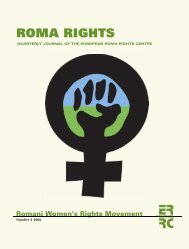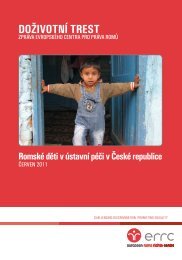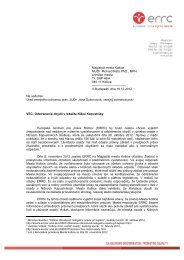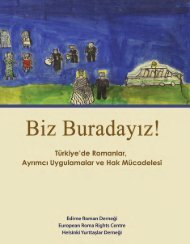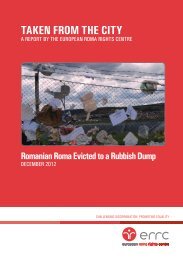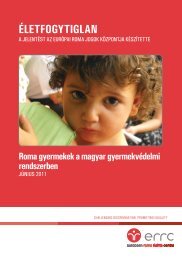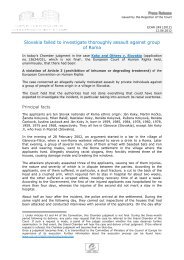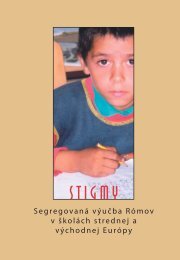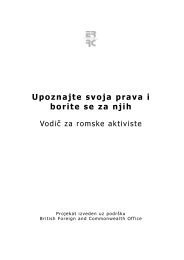security a la italiana sicurezza all'italiana securitate a la italiana
security a la italiana sicurezza all'italiana securitate a la italiana
security a la italiana sicurezza all'italiana securitate a la italiana
Create successful ePaper yourself
Turn your PDF publications into a flip-book with our unique Google optimized e-Paper software.
26<br />
ITALY REPORT<br />
While police and other state actors were noted to target informal camps more frequently,<br />
residents of some formally-established, government-sanctioned camps also reported abusive<br />
police raids having taken p<strong>la</strong>ce in recent months. In addition, police raids of their homes and<br />
camps were noted to take p<strong>la</strong>ce regu<strong>la</strong>rly, so the same persons must endure the same abusive<br />
treatment by police officers on a constant basis. For example, Italian Roma living in Rome’s<br />
Via Salviati camp reported to members of the Coalition that police officers conducted regu<strong>la</strong>r<br />
checks of the camp, at least every week or two. 33 During such checks, Italian and non-Italian<br />
Roma are forced to ensure relentless checks of their personal documents, a degrading form<br />
of treatment to which non-Roma Italians and invisible immigrants are not subjected.<br />
One Romani woman living in a Rome’s semi-formal Camp Casilino 900 testified to<br />
the Coalition that in early April 2008, police officers entered the camp and destroyed 36<br />
shacks. e woman testified,<br />
“I had a depot where I store things that I sell at the market. Approximately 6 weeks<br />
ago the police came and destroyed the depot together with 36 shacks. I was not allowed<br />
to remove my belongings though I begged them to allow me. In response they<br />
screamed at me, ‘Go away!’<br />
I have several health issues, including heart problems. When the police were destroying<br />
my depot, my heart condition worsened. Only after half an hour did the police allowed<br />
me to take my medicine from my house. After taking the medicine, I felt very weak and<br />
wanted to lie down but police did not allow me. I was only allowed to sit on a chair.<br />
When they destroyed the depot, the police threatened that they will destroy my house<br />
and all the camp soon, as well. Actually, they would have wiped out my house the<br />
same day together with the depot but my health condition stopped them.” 34<br />
One Romani individual living in Rome’s semi-formal Camp Casilino 900 camp with<br />
whom the Coalition spoke stated, “e police sometimes arrive at 2:00-3:00 AM. ey<br />
even break the doors of the shacks. ey order people to go out in a very hostile and violent<br />
way. e police are full of prejudices against Roma.” 35<br />
Another person living in Rome’s semi-formal Camp Martora reported that, “ey [the<br />
police] enter the houses very violently. ey destroy things! During one of the night raids,<br />
my son peed his pants because of fear. When they come at night, they do not respect privacy.<br />
Women may be naked!” 36<br />
Overall, the Coalition noted a feeling amongst many interviewees that in recent months<br />
the attitude of police officers has worsened and that many police behave in a way which<br />
indicates their belief that they can treat Roma as they please with no fear of repercussion.<br />
33 Coalition interview with an Italian Romani man. Rome, 28 May 2008.<br />
34 Coalition interview with a Montenegrin Romani woman. Rome’s Camp Casilino 900, 28 May 2008.<br />
35 Coalition interview with a Montenegrin Romani man. Rome’s Camp Casilino 900, 27 May 2008.<br />
36 Coalition interview with a Romani man from the former Yugos<strong>la</strong>via. Rome’s Camp Martora, 28 May 2008.



